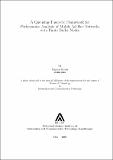| dc.contributor.advisor | Lenin, R. B. | |
| dc.contributor.advisor | Srivastava, Sanjay | |
| dc.contributor.author | Shah, Sapan | |
| dc.date.accessioned | 2017-06-10T14:37:34Z | |
| dc.date.available | 2017-06-10T14:37:34Z | |
| dc.date.issued | 2008 | |
| dc.identifier.citation | Shah, Sapan (2008). Queueing-theoretic framework for perfermance analysis of mobile ad hoc networks with finite buffer nodes. Dhirubhai Ambani Institute of Information and Communication Technology, ix, 43 p. (Acc.No: T00177) | |
| dc.identifier.uri | http://drsr.daiict.ac.in/handle/123456789/214 | |
| dc.description.abstract | Wireless Ad Hoc network is a decentralized wireless network which allows nodes to join and create networks without any infrastructure. These kinds of networks are advantageous because they can be readily deployed anywhere, anytime. Mobile Ad Hoc Network (MANET) is a special type of ad hoc network where nodes are mobile. Due to mobility of the nodes, network topology may change rapidly and unpredictably.
MANETs are expected to plat a vital role in a variety of applications and are therefore studied extensively. It is imperative to analyze these networks, to assess the suitability of their use in different scenarios and to identify the techniques to improve their performance. In last few years, many models have been proposed to analyze MANETs. Many of then have an unrealistic assumption of an infinite buffer in each node. Moreover, in MANETs, as nodes are mobile, a packet may revisit the same node which creates feedback loops of a packet. These loops make modeling and analysis of MANETs difficult as the network becomes cyclic.
This work analyzes MANET with finite buffer nodes. Open finite queuing network with gated queue, intermittent links and servers is used. The expansion method technique has been used to study the open finite queuing network with stable links and servers. We modify the method for intermittency. Numerical results are derived and compared with simulation results to show effectiveness of the method. | |
| dc.publisher | Dhirubhai Ambani Institute of Information and Communication Technology | |
| dc.subject | Ad-hoc networks | |
| dc.subject | Security measures | |
| dc.subject | Ad-hoc networks | |
| dc.subject | Quality control | |
| dc.subject | Wireless LANs | |
| dc.subject | Routing | |
| dc.subject | Computer network management Ubiquitous computing | |
| dc.subject | Computer network protocols | |
| dc.subject | Computer network architectures | |
| dc.subject | Quality control | |
| dc.subject | Mobile ad-hoc networks | |
| dc.subject | Dynamic networks | |
| dc.subject | Optimum Link State Routing | |
| dc.subject | Multipoint relays | |
| dc.subject | Quality of Service | |
| dc.subject | Pervasive computing | |
| dc.classification.ddc | 004.65 SHA | |
| dc.title | Queueing-theoretic framework for perfermance analysis of mobile ad hoc networks with finite buffer nodes | |
| dc.type | Dissertation | |
| dc.degree | M. Tech | |
| dc.student.id | 200611048 | |
| dc.accession.number | T00177 | |

